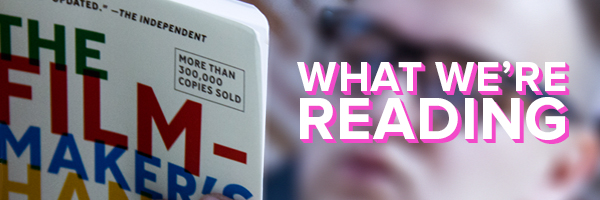Welcome back to another installment of What We’re Reading, Marxent’s weekly series featuring staff members dishing on what they’ve been reading (or watching … or listening to) for the past 7 days. This week, the Marxent staff went deep with stories from Wired, The Verge, Popular Science and more. We get started this week with a story from Aeon that’s guaranteed to mess with your mind. Enjoy!
The Best Thing We Read This Week …
Marxent System Architect Paul Militello suggested an amazing article for this week’s What We’re Reading. It’s a real doozy called, “The empty brain — Your brain does not process information, retrieve knowledge or store memories. In short: your brain is not a computer,” by Robert Epstein. The author breaks down the way humans have repeatedly been inspired by new technology to define the way we think about how our brains and bodies work, and the microprocessor is just the latest link in that historic chain. Paul liked it because, “The story talks about the nature of the brain and how the language/concepts we use to describe it constrain our thinking and can lead to flawed ideas.” It’ll mess with your mind, for sure. Don’t miss this one!
The Best Books We Read This Week …
 Sonia Schechter, our Executive Director of Marketing, has been paging her way through “Lab Girl,” the autobiography of Hope Jahren. “It is a curious and stunning portrait of what it means to be a woman in science today,” Sonia says. “I was especially taken with how much she attributes her success in pursuing her passion to relationships — both to her lab partner and within her family. No one does it alone.”
Sonia Schechter, our Executive Director of Marketing, has been paging her way through “Lab Girl,” the autobiography of Hope Jahren. “It is a curious and stunning portrait of what it means to be a woman in science today,” Sonia says. “I was especially taken with how much she attributes her success in pursuing her passion to relationships — both to her lab partner and within her family. No one does it alone.”
Senior Project Manager Steve Messer was recently reminded of a book he frequently re-reads titled “Good to Great,” by Jim Collins. “While I think about just those three words nearly everyday, the book also has a concept about getting the right people on the bus, which is exactly where we are as a company,” he explains. “In short, the bus is the company and you have to get the right people in the right seat as you figure out where you are going.”
For Your Listening Pleasure …
Nick Kizirnis is a one man music suggestion service. This week, he offered up two selections to tap your toes to. Up first is the latest record from Thao & The Get Down Stay Down, called “A Man Alive.” Nick calls the song, “edgy, jagged and fantastic. At one point they were described as alternative folk rock, but something bizarre happened on the way to making this one.” Indeed.
Nick’s second musical selection is a highly personal choice, not because of the song but because of who is in the music video. “My son Joey makes him rock music video debut as the co-star of Donal Hinely‘s new video ‘From the Day,'” Nick says. “Donal’s an amazing song-writer, and it turns out Joey’s a pretty good actor.” Congrats on your debut, Joey. We’re looking forward to highlighting your future video endeavors in this space.
But wait, there’s (so much) more …

Sarah Pennington is Marxent’s new HR Administrator, and we’re already digging her taste in online reporting. Sarah’s first submission for What We’re Reading is a Wired piece by Jason Tanz titled, “The End of Code: Soon we won’t program computers. We’ll train them like dogs.” “In college I was always fascinated with the history of psychology. The strides we have made to understand the human brain and the different variables that make it up. I found this article interesting because it made me wonder if one day we will study computers in the same way that we once studied the human brain,” Sarah says. “Will there one day be a class devoted to the psychology of computers or even a history of psychology and computers. I can’t decide if this is an extremely scary thought or something to be very excited about.”
Did you follow Google I/O this week? An annual get-together where the big G takes the wraps off new products and services, this year’s event featured a new version of Android, two new messaging apps, a competitor for Amazon’s popular Echo, and the unveiling of something called Google Daydream, a VR platform that got us pretty excited. You can read all about “The 10 Biggest Announcements from Google I/O 2016” in this exhaustive and informative post by The Verge.
Sonia Schechter is close to finishing A Lego Brickumentary, which is a documentary about the business and fan culture of Lego. “It is a fascinating look at what Lego brought to the world of toys and how Lego (the brand) lost total control of their brand through fan communities,” Sonia explains. “The things that people make out of Lego and the infinite doors to the imagination that are opened through the toy are captivating. They also talk about the idea of controlled creativity which is facilitated by the format of creating with Lego. I definitely recommend watching it.”
Sometimes all this technology allows for a very human interaction that would otherwise be impossible. I was reminded of this fact earlier this week, after I happened on a story about how a developer used his HoloLens to take his 93-year-old great-grandfather on tour of Machu Picchu. It’s a touching story, and a strong reminder of the positive impact technology can have on our lives.
And then, other times, we’re reminded that all this technology can lead to some unintentionally hilarious moments, like the following video:
As Virtual Reality continues to seep into the mainstream, questions about the privacy of the users were sure to pop up quickly — and now, thanks to a sitting senator, they have. According to the AP, Sen. Al Franken (D-Minn.) wrote an open letter to Oculus CEO Brendan Iribe earlier this month asking for details about user data collected by the new VR system, which can detect movement, location and sound. For their part, Oculus seems unworried, with Jason Rubin, Oculus’ head of worldwide studios, downplaying questions raised about the VR system’s privacy policy. “It’s a new medium,” Rubin told AP. “People want to know. They have a right to ask. We’ll answer. It’ll be fine.”
When will Sony release their highly anticipated Playstation VR headset? Signs point to Oct. 12 …
And finally …
At Marxent, we’re obviously passionate about the future of AR and VR products, and a big part of that passion is a drive to get it right and make the systems useful to people. The future we envision is a far cry from Keiichi Matsuda’s new short film, “Hyper-Reality,” in which the filmmaker has created a world where AR has run amok and penetrated every aspect of the users waking life. The results quickly become kind of terrifying — unless living out your days inside a smartphone game sounds appealing to you. Ok, fine, you may be insane.












